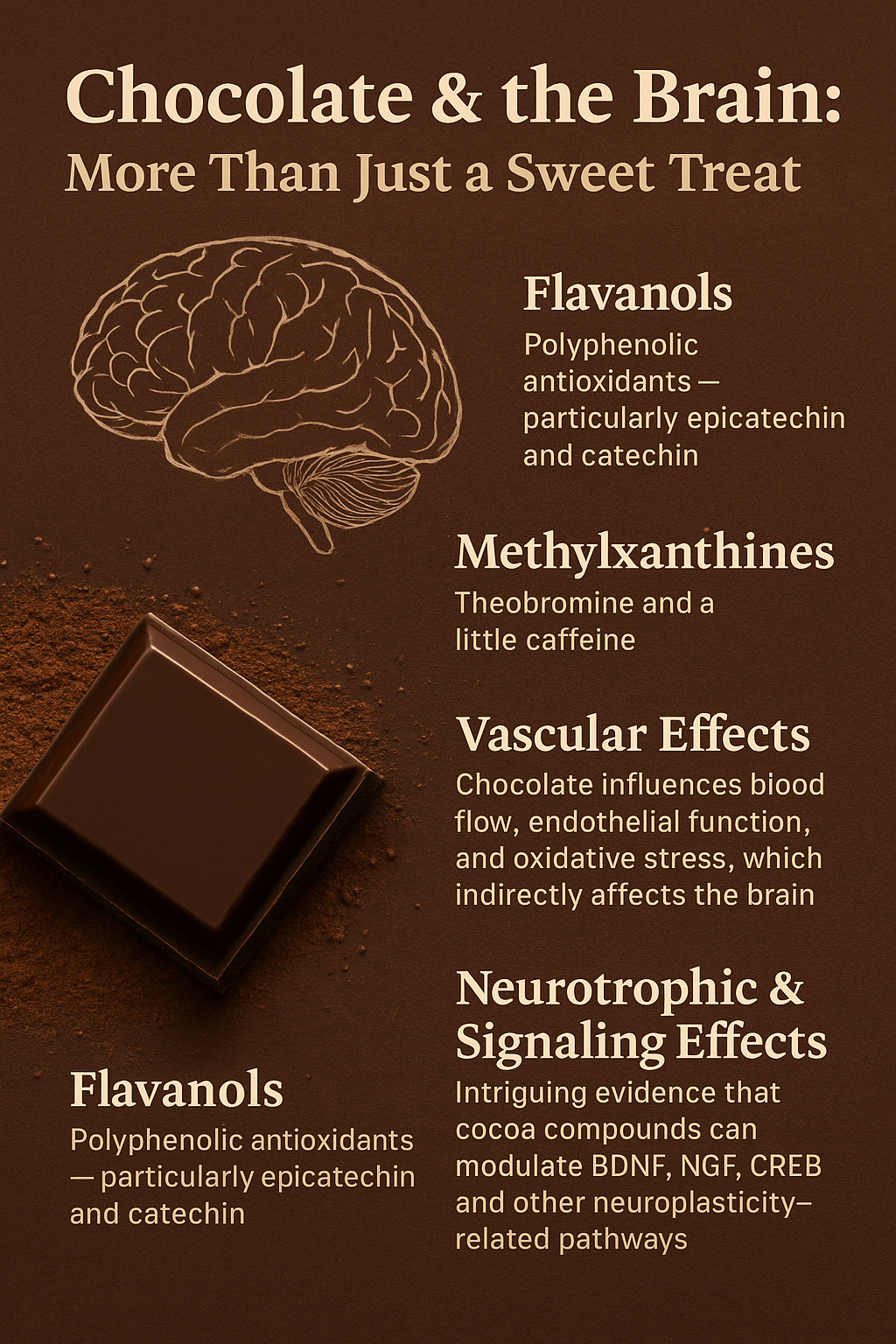 We often think of chocolate as a comfort food a mood booster, an indulgence, a little luxury that makes the day better. But beyond its luscious taste, cocoa especially high-cacao dark chocolate contains bioactive compounds that may influence our brain, memory, and cognition in fascinating ways.
We often think of chocolate as a comfort food a mood booster, an indulgence, a little luxury that makes the day better. But beyond its luscious taste, cocoa especially high-cacao dark chocolate contains bioactive compounds that may influence our brain, memory, and cognition in fascinating ways.
Here’s what current science suggests and where the uncertainties remain.
What’s inside chocolate that “talks” to your brain?
Cocoa is a rich natural pharmacy among its best-studied components are:
• Flavanols: Polyphenolic antioxidants particularly epicatechin and catechin are found abundantly in cocoa beans.
• Methylxanthines: Compounds such as theobromine and a touch of caffeine, which stimulate alertness and improve blood flow.
• Vascular effects: Cocoa flavanols support healthy circulation and endothelial function, indirectly nourishing the brain.
• Neurotrophic & signalling effects: Early research suggests that cocoa compounds may influence pathways linked with learning and memory, including BDNF, NGF, and CREB, which govern neuroplasticity.
These mechanisms are still being clarified, but they point towards a consistent theme: cocoa supports the body systems that feed the brain.
What the evidence says about chocolate & memory
1. Short-term effects (within hours)
In a 2019 study, young adults who ate 35 g of 70 % dark chocolate performed better on verbal memory tests two hours later than those who ate a calorie-matched white chocolate bar.
Other studies using flavanol-rich cocoa drinks found short-term improvements in executive function, spatial memory, and attention.
One crossover trial comparing high-polyphenol (635 mg) versus low-polyphenol (212 mg) chocolate found that the higher-polyphenol version helped maintain accuracy during mentally demanding tasks the lower-polyphenol group’s performance dropped as fatigue set in.
2. Longer-term effects (weeks or months)
In a 30-day trial, daily dark-chocolate consumption improved cognitive performance on tests like the Stroop and cancellation tests, accompanied by a rise in nerve growth factor (NGF) levels.
A broader review found that regular cocoa flavanol intake was linked with better verbal fluency and trail-making performance, along with healthier blood pressure and insulin sensitivity factors closely tied to long-term brain health.
A recent fMRI study revealed that after consuming high-polyphenol chocolate, participants’ frontal and parietal brain regions became more efficient showing less activation during cognitive effort compared to low-polyphenol chocolate. In simple terms: their brains worked smarter, not harder.
Caveats & context
Effects vary between individuals' age, genetics, vascular health, and baseline diet all matter.
Many studies use specially prepared high-flavanol cocoa, not standard retail chocolate. Commercial bars vary widely in flavanol content.
Overconsumption brings caloric and metabolic downsides that can offset benefits.
The exact mechanism improved blood flow vs. antioxidant or neurotrophic effects remains under investigation.
So yes, chocolate can support cognitive health, but moderation and quality are key.
A mindful, flavourful ritual
Picture this: you break off a small square of 85 % dark chocolate mid-afternoon. As it melts, flavanols and theobromine quietly get to work dilating blood vessels, enhancing oxygen delivery, and tuning neuronal communication in the hippocampus. You may not notice the shift, but over time that simple ritual paired with good sleep, movement, and a balanced diet could gently reinforce your mental sharpness.
How to choose wisely
Aim for ≥ 70 % cocoa solids darker usually means richer in flavanols.
Watch sugar and fat levels purity beats excess.
Store cool, eat fresh oxidation reduces flavanol content over time.
Enjoy mindfully let flavour, texture, and aroma slow your pace and reset your focus.
Chocolate isn’t a magic pill, but science increasingly supports what our senses already tell us: a small, well-made piece of dark chocolate can feed the mind as well as the spirit.
Sources (peer-reviewed and verifiable):
Socci V. et al. Frontiers in Nutrition, 2021 “Cocoa Flavanols and Cognitive Function.”
Mastroiacovo D. et al. American Journal of Clinical Nutrition, 2015.
Lamport D. et al. Appetite, 2019.
Brickman A.M. et al. Nature Neuroscience, 2014.
Nehlig A. British Journal of Clinical Pharmacology, 2013.
